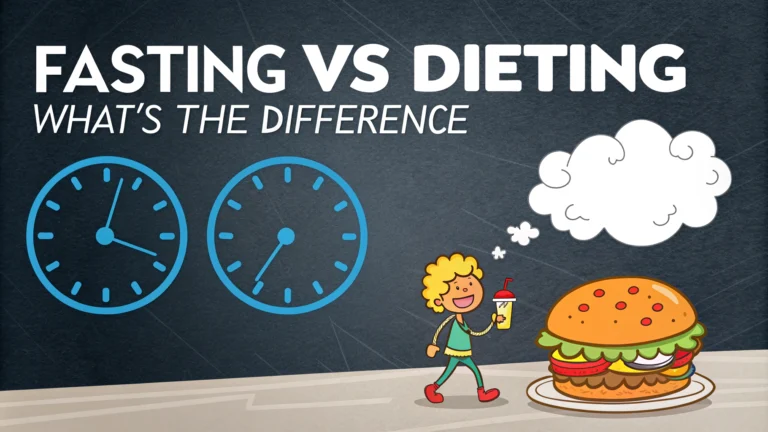Fasting and dieting represent two distinct approaches to managing food intake and achieving health goals. While both methods aim to improve health and manage weight, they work through different mechanisms and produce varying results.
The key difference lies in their fundamental approach – **fasting** focuses on *when* you eat, while **dieting** centers on *what* you eat. This simple distinction creates significant variations in how each method affects your body and lifestyle.
Key Differences Between Fasting and Dieting
- **Timing vs. Content**: Fasting controls eating windows; dieting restricts food types
- **Metabolic Impact**: Fasting targets insulin levels; dieting focuses on caloric intake
- **Flexibility**: Fasting allows food choice freedom; dieting requires constant monitoring
- **Sustainability**: Fasting often proves easier to maintain long-term
Common Types of Fasting Methods
| Method | Description |
|---|---|
| 16/8 Intermittent Fasting | 16 hours fasting, 8 hours eating window |
| 5:2 Method | 5 days normal eating, 2 days restricted calories |
| Extended Fasting | 24-72 hour fasts |
Popular Diet Approaches and Their Benefits
- **Mediterranean Diet**: Rich in whole foods, healthy fats
- **Ketogenic Diet**: High-fat, low-carb approach
- **Plant-Based Diet**: Focus on vegetables, fruits, legumes
- **Paleo Diet**: Based on whole, unprocessed foods
> “The best approach is the one you can stick to consistently. Both fasting and dieting can work when implemented correctly and aligned with your lifestyle.”
Fasting vs Dieting: A Clear Guide to Weight Management
Millions choose between fasting and dieting for weight control each year. Both methods offer different paths to health goals, but understanding their core differences helps make an informed choice. This guide examines how each approach works and their practical benefits.
Understanding Basic Mechanisms
**Fasting** and **dieting** work through distinct biological pathways. Fasting focuses on timing, triggering autophagy and metabolic changes. Dieting manipulates nutrient intake and calorie control.
- Fasting: Controls eating windows
- Dieting: Manages food types and amounts
Health Benefits Compared
| Fasting Benefits | Dieting Benefits |
|---|---|
| Improved insulin sensitivity | Better nutrient balance |
| Enhanced cellular repair | Steady weight loss |
| Mental clarity | Structured eating habits |
Practical Implementation Tips
Start with these proven strategies for each approach:
- **Start Small**: Begin with 12-hour fasts or simple food swaps
- **Track Progress**: Use apps or journals to monitor results
- **Stay Hydrated**: Essential for both methods
Common Challenges and Solutions
**Fasting Challenges:**
– Hunger management: Drink water, stay busy
– Social situations: Plan eating windows around events
– Energy dips: Schedule fasts during sleep hours
**Dieting Challenges:**
– Food prep time: Batch cook meals
– Tracking fatigue: Use simplified measuring methods
– Cravings: Find healthy substitutes
Long-term Success Strategies
Build sustainable habits through:
- **Consistent Schedule**: Set regular eating patterns
- **Environment Control**: Stock healthy options
- **Support System**: Join communities with similar goals
Safety Considerations
> “Always consult healthcare providers before starting any new eating pattern, especially if you have underlying health conditions.”
Key safety points:
– Monitor energy levels
– Watch for warning signs
– Know when to modify approach
Combining Methods Effectively
Learn to blend approaches:
– Time-restricted eating with healthy food choices
– Alternate-day fasting with nutrient-dense meals
– Modified fasting with balanced meal plans
Making Your Choice
Select based on:
- **Lifestyle compatibility**
- **Health goals**
- **Personal preferences**
Remember that success comes from consistency rather than perfection. Choose the method that fits naturally into your daily routine and supports your long-term health objectives.
Fasting vs Dieting FAQs
General FAQs
Q: What’s the main difference between fasting and dieting?
A: Fasting focuses on when you eat, creating specific eating windows and fasting periods. Dieting focuses on what you eat, typically involving calorie restriction or specific food choices.
Q: Which is more effective for weight loss – fasting or dieting?
A: Both can be effective for weight loss when done correctly. The best choice depends on individual lifestyle, health conditions, and personal preferences. Research shows similar weight loss results between intermittent fasting and traditional calorie restriction.
Q: Can you combine fasting and dieting?
A: Yes, many people combine both approaches by following specific dietary guidelines during eating windows. Popular combinations include:
- Keto diet with intermittent fasting
- Mediterranean diet with time-restricted eating
- Plant-based diet with alternate-day fasting
Long-tail Keyword FAQs
Q: How long should beginners fast for weight loss?
A: Beginners should start with a 12-hour fasting window, typically overnight. Gradually increase to 14-16 hours as comfortable. Common beginner schedules:
- 12/12 schedule (7pm to 7am)
- 14/10 schedule (7pm to 9am)
- 16/8 schedule (7pm to 11am)
Q: What breaks a fast but not ketosis?
A: Items that may break a fast but maintain ketosis include:
| Allowed | Not Allowed |
|---|---|
| Black coffee | MCT oil |
| Plain tea | Bone broth |
| Water | Bulletproof coffee |
Q: Is fasting healthier than calorie counting?
A: Neither is inherently healthier. Both methods show benefits for:
- Blood sugar regulation
- Weight management
- Metabolic health
The “healthier” option is the one you can sustain long-term.
Q: Which type of fasting burns the most fat?
A: Extended fasting periods (24-36 hours) typically show the highest fat oxidation rates. However, shorter daily fasting windows (16/8) are more sustainable and practical for most people.
Q: Can I lose weight faster with fasting than dieting?
A: Initial weight loss might be faster with fasting due to water weight reduction. Long-term fat loss rates are similar between fasting and traditional dieting when calorie deficits are equal.
Q: What happens if you exercise while fasting?
A: Exercise during fasting can:
- Increase fat burning
- Improve insulin sensitivity
- May reduce performance in high-intensity workouts
- Require proper hydration and electrolyte balance
Q: Does fasting slow metabolism like dieting?
A: Short-term fasting (16-24 hours) doesn’t significantly impact metabolism. Extended calorie restriction through either method may lead to metabolic adaptations.



















